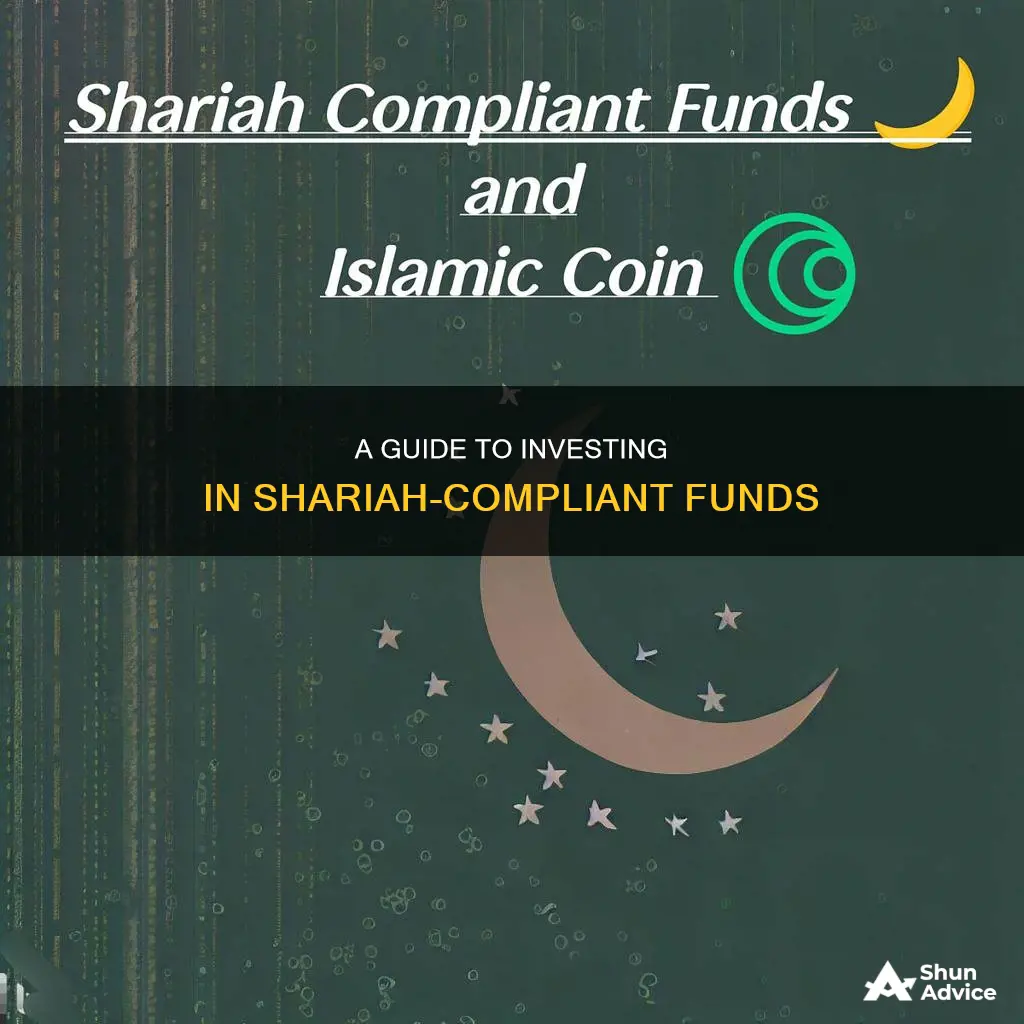
Shariah-compliant funds are investment funds that adhere to the requirements of Shariah law and the principles of the Islamic religion. These funds are considered a type of socially responsible investing, where the focus is on both financial return and social impact. Shariah-compliant funds have a set of principles that guide investment decisions, including the prohibition of interest, the avoidance of haram (forbidden) activities, and the promotion of transparency and fairness. These funds are not exclusive to Muslim investors and offer a unique approach to investing that aligns with ethical and social values. With the growing demand for socially responsible investing, Shariah-compliant funds present an attractive opportunity for those seeking to invest in a way that contributes to societal development while also generating returns.
| Characteristics | Values |
|---|---|
| Type of investment | Socially responsible investing |
| Governing law | Shariah law, Islamic law |
| Who can invest | Anyone, not exclusive to Muslims |
| Interest | Prohibited |
| Risk | Avoids immoderate levels of risk |
| Debt | No investment in companies with high debt |
| Income | No investment in fixed-income instruments |
| Sectors | No investment in companies involved in alcohol, tobacco, pork, weapons, military equipment, gambling, pornography, or night clubs |
| Debt-to-asset ratio | No investment in companies with a total debt of one-fourth of its total assets or more |
| Interest income | Can invest in companies with interest income up to 3% of total income |
| Shares | No acquisition of shares of companies involved in financial services, banks, insurance companies |
What You'll Learn

Prohibition of interest
Shariah-compliant funds are investment funds that follow the requirements of Shariah law and the principles of the Islamic religion. One of the key principles of Shariah-compliant funds is the prohibition of interest, also known as "riba" in Islamic terminology. This prohibition is based on the belief that charging interest is exploitative and disadvantages the borrower, benefiting only the lender.
In Shariah-compliant investing, Muslims are discouraged from engaging in any investment deals that involve paying or receiving interest. Instead, Islamic banks agree on a predetermined amount of profit or loss from the business. This is a fundamental principle that differentiates Shariah-compliant funds from conventional investment funds, which often rely on interest-based transactions.
To ensure compliance, Shariah-compliant funds have an appointed Shariah board that oversees the avoidance of forbidden sources of income, such as interest. Any prohibited types of income, such as interest, are purified by donating them to charity. This process adds complexity and costs to the management of these funds, as Islamic scholars serving on the boards may have differing interpretations of Islamic law, leading to time-consuming discussions to reach a consensus.
The prohibition of interest in Shariah-compliant funds also extends to the types of companies these funds can invest in. These funds are restricted from investing in companies that deal heavily in interest-based transactions, such as banks and insurance companies. Additionally, they cannot invest in companies that generate a significant portion of their income from activities considered haram, which includes the sale of alcohol, pork, tobacco, weapons, gambling, and pornography.
While the prohibition of interest may limit the number of investment choices, it aligns with the ethical and social focus of Shariah-compliant funds. This type of investing prioritises the prevention of social harm and the protection of individuals, promoting the Islamic value of "togetherness" through risk-sharing among stakeholders.
Robinhood Market Fund Investment: A Beginner's Guide
You may want to see also

Avoidance of haram
Shariah-compliant funds are investment funds that adhere to the requirements of Shariah law and the principles of the Islamic religion. These funds are considered a type of socially responsible investing.
Haram is an Arabic term in Islam that describes anything that is forbidden, inviolable, or sacred according to Shariah law. In the context of social investment, this specifically refers to interest-bearing financial agreements, as well as loans or investments in sectors that involve forbidden activities. These forbidden activities include:
- Gambling
- Alcohol
- Weaponry and military equipment
- Pork products
- Pornography
Muslims are expected to avoid interests or Riba. According to the Quran, engaging in Riba is considered a war against God. Therefore, Muslims are not permitted to invest in companies that deal with Riba. Shariah-compliant funds prohibit all forms of interest, and any income from forbidden sources is purified by donating it to charity.
Shariah-compliant funds also forbid investments in companies that could harm other people, either physically or emotionally, or harm the environment. This includes companies that promote weapons, alcohol, tobacco, and other substances or activities considered harmful in Islam.
The avoidance of Haram is a fundamental principle in Shariah-compliant investing, ensuring that investments align with the moral and ethical values of the Islamic faith.
Equity Funds: Where to Invest and Why
You may want to see also

Socially responsible investments
Shariah-compliant funds are considered a type of socially responsible investing. They are investment funds governed by the requirements of Shariah law and the principles of the Islamic religion.
Shariah-compliant funds are one of many categories found in socially responsible investing. Similar to other socially responsible funds within the environmental, social and governance (ESG) universe, the funds screen potential portfolio investments for specific requirements desired by followers of the Islamic religion.
Shariah-compliant funds have certain restrictions on their investment types. These funds invest within the boundaries of Islamic laws. The key features of these funds are:
- Muslims cannot invest in anything that could harm other people either physically or emotionally, or that could harm the environment, or in companies that promote weapons, etc. So, these funds forbid investments in businesses that generate a major portion of their income by selling alcohol, tobacco, pork, weapons and other military equipment, gambling, and pornography.
- Muslims are expected to avoid interest or Riba. As per the Kuran, it is considered that anyone who engages in this has engaged in a war against God. This is why Muslims are also not allowed to invest in companies that deal blatantly in Riba. So, these funds prohibit all forms of interest. An appointed Shariah board avoids such forbidden sources of income by distributing it to charity.
- These funds tend to avoid immoderate levels of risk. Derivatives and companies with high debts are not included.
- These funds avoid investment in fixed-income instruments.
- These funds are not only confined to the followers of Islam, all investors of every religion are allowed to invest in the fund.
Shariah-compliant funds have expanded in popularity only recently, even though the concept was first developed in the late 1960s. According to a 2011 report by consulting firm PricewaterhouseCoopers (PwC), Shariah-compliant funds grew at an annualized rate of 26% in the first ten years of this century.
Shariah-compliant funds are designed for the prevention of social harm and the protection of the individual. For example, lending money at high rates of interest is impermissible due to the risks of debt, inflation and monopolising investment in the benefit of high-end investors.
High-Yield Bond Funds: Smart Investment, Higher Returns
You may want to see also

Transparency and fairness
Shariah-compliant funds are considered a type of socially responsible investing. They are guided by the principles of Islamic faith and are designed to prevent social harm and protect the individual. As such, transparency and fairness are crucial to ensuring that investments are ethical and responsible.
Shariah-compliant funds often involve rigorous asset screening to ensure that investments comply with Shariah guidelines. This includes avoiding investments in businesses that are considered harmful to people, the environment, or that go against Islamic ethics (Haram). This includes industries such as alcohol, gambling, pork, weapons, and pornography.
Additionally, Shariah-compliant funds tend to avoid immoderate levels of risk and derivatives, as well as companies with high debts. They also prohibit earning or paying interest (Riba), which is considered unethical in Islamic finance. Instead, these funds generate returns through permissible means, such as profit-sharing agreements and ethical investments.
The transparency and fairness of Shariah-compliant funds offer peace of mind to investors, knowing that their investments align with their religious and ethical beliefs. It is important to note that there is no one-size-fits-all approach to Shariah-compliant investing, and investors should have conversations on a case-by-case basis to ensure compliance with their specific interpretations of Islamic principles.
A Guide to Investing in Nifty 50 Index Funds with Zerodha
You may want to see also

Balanced distribution of wealth
Shariah-compliant funds are investment funds that are governed by the requirements of Shariah law and the principles of the Islamic religion. These funds are considered a type of socially responsible investing.
Shariah law requires a balanced distribution of wealth between the parties involved in a financial transaction. This means that investors and investees should share both the profits and losses of their ventures. This promotes the Islamic value of 'togetherness' as both parties carry risk, protecting them from one party gaining at the expense of another.
Shariah law also mandates that investors pay a certain percentage of their wealth as charity (zakat) to purify their income and help those in need. This further ensures a balanced distribution of wealth.
In addition to the balanced distribution of wealth, Shariah-compliant funds have several other key features and requirements:
- Prohibition of Riba (interest or cost of capital)
- Avoidance of Haram (anything considered 'forbidden, inviolable or sacred' according to Shariah Law, including interest-bearing financial agreements and investments in sectors such as gambling, alcohol, and weaponry)
- Socially responsible investments that focus on the social impact delivered to beneficiaries alongside financial returns
- Transparency and fairness throughout every stage of the investment process
- Avoidance of excessive risk and high-debt companies
- Exclusion of fixed-income instruments and derivatives from investment portfolios
Best Funds to Invest in NPS: Where to Start?
You may want to see also
Frequently asked questions
Shariah-compliant funds are investment funds that are governed by the requirements of Shariah law and the principles of the Islamic religion. These funds are considered a type of socially responsible investing.
Shariah-compliant funds have many restrictions. They cannot invest in companies that derive a majority of their income from the sale of alcohol, pork products, abusive drugs, pornography, gambling, military equipment, or weapons. They must also avoid interest-bearing assets and companies with high levels of debt.
While Shariah-compliant funds are designed to meet the specific requirements of followers of Islam, they are not exclusive to Muslims. Investors of all religions can invest in these funds.
You can invest in Shariah-compliant stocks or mutual funds. However, it can be challenging to select Shariah-compliant stocks. In that case, investing in a Shariah-based mutual fund can be a good option. There are several Shariah-compliant mutual funds available, such as the Tata Ethical Fund and the Taurus Ethical Fund in India. Before investing, be sure to review the fund details available in the Key Information Memorandum (KIM) and the Scheme Information Document (SID) to understand the risk profile, asset allocation, past performance, and other details about the fund.







